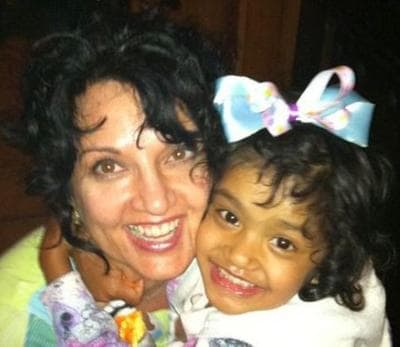Advertisement
Revere Woman Questions Frustrating Nepalese Adoption, Fraud Claims
Last October, we introduced you to a woman from Revere who was caught in an international adoption nightmare.
Dee Dee Milton went to Kathmandu, Nepal, to adopt a daughter. After she took custody, she was unable to get her daughter a U.S. visa because the United States shut down all adoptions from Nepal, citing untrustworthy documentation. After months of investigation, she got the visa, but now a question remains: Was the government right to shut down the program?

"I’m a single woman," Milton said when she was in Kathmandu. "The Nepal adoption program was open to single women and there weren’t many that were open to single women, so I did come alone."
Milton ended up spending five months living in Nepal, fighting for the right to bring her 4-year-old adopted daughter, Bina, home.
"I anticipated being in Nepal from Aug. 1, when I left Massachusetts, to Sept. 1, which was the day I was booked to come home," she said.
Milton took out a home equity line of credit to afford living in Nepal, hiring lawyers and investigators to prove her daughter was, in fact, abandoned.
"I was on an unpaid leave from my job so I literally had no funds coming in the entire time I was gone and then came home to unemployment," Milton said.
Unemployed and angry, she asks, why did the U.S. State Department hold up her adoption? She was one of 66 Americans with delayed adoptions in Nepal. But having Bina come home with her has eased the frustration.
Bina is now living the life of a typical American toddler. She goes to preschool, visits every day with her grandmother and torments the cat, Bubba.
Janice Jacobs says she understands Milton’s frustration. She’s the assistant secretary of State for Consular Affairs. But Jacobs argues Nepal’s child adoption system isn’t trustworthy.
Advertisement
"They estimate — the NGOs with a lot of on-the-ground experience — that perhaps 10 percent of the children who turn up as orphans are in fact abandoned," Jacobs said.
The State Department worries as many as 90 percent of children in Nepalese orphanages may have been sold by a child trafficker under false pretenses. But Milton is still skeptical. If that’s the case, she asks, why didn’t the U.S. government find more fraud in the 66 cases it reviewed? All but one have been cleared for visas.
"All of the families and these investigators were able to produce ample evidence that the children are not trafficked and that the children are not fraudulent and that the children are authentic orphans and worthy of a visa," Milton said.
But fraud is hard to prove, says Conor Grennan, the founder of the NGO Next Generation Nepal. He has helped reconnect 400 trafficked children with their families. He says some of the children in orphanages have been kidnapped. Other children have been sold by their families to brokers, who claim they will educate and care for them.
"They are selling them as domestic servants," Grennan said. "And in the worst cases I’ve seen they are actually forging death certificates for families and putting these children up for international adoption. And again we’ve seen this."
Grennan says the child trade continues because it’s lucrative. Orphanages can make $5,000 a child from an international adoption — a lot of money in a country where more than half of the population lives on less than $1.25 a day, according to UNICEF.
Milton says she feels positive Bina was not trafficked because of the investigation into her case. But given what she’s had to go through with the U.S. government to get Bina, she’s irritated and worried about how U.S. policy to close adoption affects other Nepali orphans.
"No incidents of fraud have been found and there are so many children left behind?" Milton asked.
Jacobs says Nepal has to make sweeping changes to its child welfare system if the U.S. is to reopen adoption.
"They have to work on a system that builds in better protections for these children and they also have to find ways to look for domestic solutions," Jacobs said.
UNICEF estimates there are 650,000 orphans in Nepal.
Earlier:
This program aired on May 11, 2011.